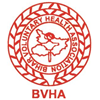Emergency Disaster Relief Work
Bihar, India’s most flood-prone state, faces annual flood disasters. About 76% of the population in northern Bihar lives under this constant threat. These floods result in significant loss of life, damage to crops, livestock, and assets worth millions, posing a recurring challenge for both people and the state’s economy.
BVHA plays a crucial role in addressing and mitigating the impact of disasters. BVHA works on disasters in three ways: Disaster risk reduction, immediate disaster response and post disaster response. BVHA does these relief works directly or with support of BVHA’s network organizations.
Disaster Risk Reduction (DRR): BVHA recognizes that preventing disasters or minimizing their impact is as important as responding to them. Therefore, the organization actively engages in disaster risk reduction efforts. This involves various strategies and initiatives aimed at identifying, analysing, and reducing the underlying factors that make communities vulnerable to disasters. BVHA works on measures such as conducting risk assessments, developing, and implementing disaster preparedness plans, and liaison with Govt. to enhance resilience. By addressing the root causes of vulnerability, BVHA aims to create more disaster-resilient communities in the long term.
Immediate Disaster Response: When a disaster strikes, BVHA swiftly springs into action to provide immediate relief to affected communities. This phase involves deploying teams of trained volunteers and professionals to the disaster-affected areas. BVHA arranges and provide emergency food packets, water, medical assistance through continuous health camps in the flood affected areas, and other essential supplies to those in need.
Post-Disaster Response: BVHA recognizes that the result of a disaster can be long-lasting, with communities and the communities are vulnerable and susceptible of water borne diseases. So BVHA mainly focuses on Post Disaster Health camps to address the health needs of the communities.
